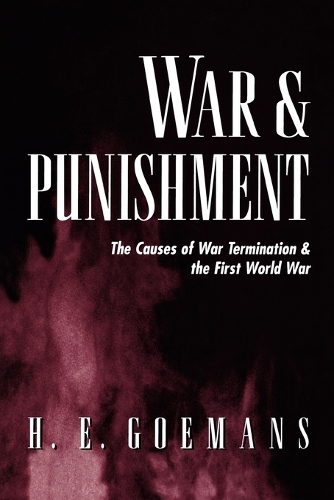
War and Punishment: The Causes of War Termination and the First World War
(Paperback)
Publishing Details
War and Punishment: The Causes of War Termination and the First World War
By (Author) Hein Goemans
Princeton University Press
Princeton University Press
31st October 2000
United States
Classifications
Professional and Scholarly
Non Fiction
European history
First World War
Political science and theory
General and world history
940.31
Physical Properties
Paperback
368
Width 152mm, Height 235mm
510g
Description
What makes wars drag on and why do they end when they do Here H. E. Goemans brings theoretical rigor and empirical depth to a long-standing question of securities studies. He explores how various government leaders assess the cost of war in terms of domestic politics and their own postwar fates. Goemans first develops the argument that two sides will wage war until both gain sufficient knowledge of the other's strengths and weaknesses so as to agree on the probable outcome of continued war. Yet the incentives that motivate leaders to then terminate war, Goemans maintains, can vary greatly depending on the type of government they represent. The author looks at democracies, dictatorships, and mixed regimes and compares the willingness among leaders to back out of wars or risk the costs of continued warfare. Democracies, according to Goemans, will prefer to withdraw quickly from a war they are not winning in order to appease the populace. Autocracies will do likewise so as not to be overthrown by their internal enemies.Mixed regimes, which are made up of several competing groups and which exclude a substantial proportion of the people from access to power, will likely see little risk in continuing a losing war in the hope of turning the tide. Goemans explores the conditions and the reasoning behind this "gamble for resurrection" as well as other strategies, using rational choice theory, statistical analysis, and detailed case studies of Germany, Britain, France, and Russia during World War I. In so doing, he offers a new perspective of the Great War that integrates domestic politics, international politics, and battlefield developments.
Reviews
"Goemans makes a significant addition to our understanding of war termination. In addition, the book is so well written that it is a valuable source for readers at all levels."--Choice "One can disagree with particular interpretations of Goemans, or even question his overall thesis, but it is a thesis that must be taken seriously. Goemans is to be congratulated for producing a book of value to scholars and to policy-makers, given the obvious implications of his findings for strategy."--Richard Ned Lebow, International History Review "The greatest strength of this book is that it is eminently thought-provoking, and that is praise not lightly given."--Ralph Ashby, The Historian
Author Bio
H. E. Goemans is Assistant Professor of Political Science at Duke University.
